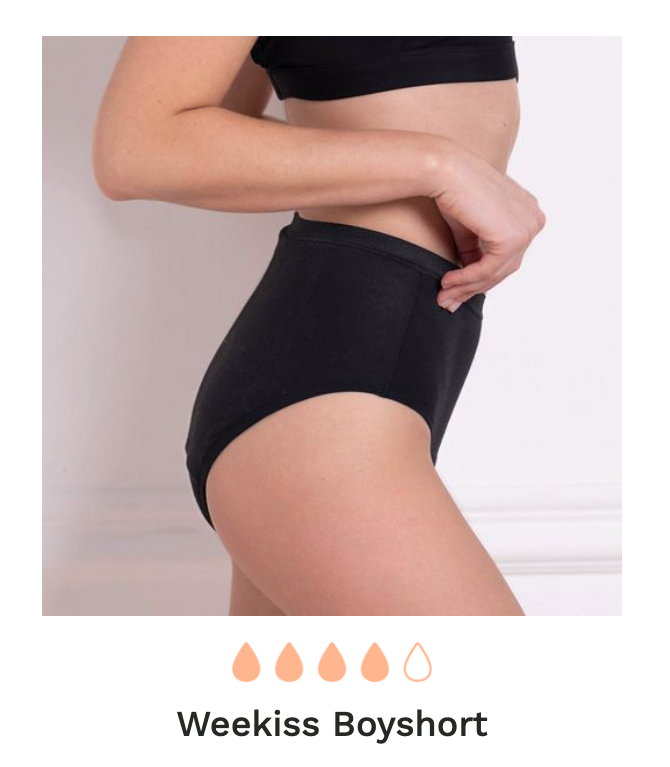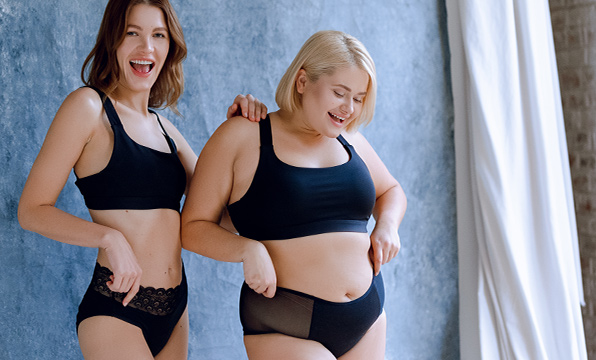During your pregnancy, you were spared your period and, with luck, didn't have to worry about things like tampons and pads. However, once your baby is born healthy, it's only a matter of time before your period returns. We'll explain when you should expect your first period after the birth of your baby, what role breastfeeding plays in it and whether your cycle can change after pregnancy.
First menstruation after birth - the most important facts at a glance
- After giving birth, the first period can start at the earliest after about five to six weeks.
- Breastfeeding significantly delays your period, so it can take a good year.
- To prevent an unwanted pregnancy, it is necessary to use contraception before the first period after giving birth.
- After pregnancy, there may be temporary or permanent changes in menstruation.
- Some women can no longer cope with their usual tampons after giving birth or even have to switch completely to other hygiene products.
Hormonal changes after giving birth
In the months before you gave birth, your hormones were completely adjusted to your pregnancy. After giving birth, hormonal changes occur that are necessary for your body to return to normal. As your placenta passes out, the hormones it produces decrease. These include progesterone and oestrogen in particular.
The decrease in hormones is the starting signal for physical involution after birth. At the same time, more hormones are now produced again, which are needed for the follicles to mature in your ovaries. However, this process is not completed in a few days. It will therefore be quite a while before you can expect your first period after your pregnancy.
When do you get your first period after giving birth?
The earliest you can expect to have your first period after pregnancy is about five weeks after giving birth. Until then, you can assume that you will not have your period. However, this does not mean that you will always have your period after five weeks.
You might have to wait a few months or even a year or more. So you don't have to worry if your period is a little longer. By the way, one factor that plays a very big role in this is breastfeeding.
Signs of your first period after giving birth
The first period after pregnancy can often come unexpectedly. A typical sign that the time has come is, of course, obvious menstrual bleeding. These often occur after the menstrual flow has already disappeared. For some women, however, the two go together almost seamlessly.
First period after birth despite breastfeeding
If you decide to breastfeed your baby, this can significantly delay your first period after giving birth. This is because the hormone prolactin, which is responsible for the production of breast milk, inhibits the maturation of your eggs. This means that ovulation is delayed and so is your period.
If you are breastfeeding your baby, it is not unusual for your period to be delayed for a year or even longer. Individual differences are possible. Depending on how often and how long you give your baby the breast, it can take shorter or longer until your first menstruation.
Can you get pregnant while breastfeeding?
Considering the fact that breastfeeding usually leads to the fact that the period is missing for the time being, the assumption is obvious that pregnancy is not possible during this time. However, this is not true. In fact, you can get pregnant while you are breastfeeding. The chances may be lower. However, the chances are undoubtedly too high to call breastfeeding a reliable contraceptive method.
This is because you don't know in advance when your body will be ready to conceive again after giving birth. This is because your first cycle after giving birth does not start with your period, but with ovulation. Since you will probably not notice this, fertilisation can happen unnoticed before your menstruation returns for the first time.
If you don't want to get pregnant, you should therefore use suitable contraceptive methods that really do protect you reliably during the breastfeeding period. If, on the other hand, you want to have a little brother or sister for your baby as soon as possible, you can of course do without contraception and take your chances.
Can I still breastfeed despite my period?
In principle, it is possible to continue breastfeeding even though your period has started again. However, you can assume that your nipples are particularly sensitive during your period, which can make breastfeeding quite uncomfortable.
In addition, the composition and taste of breast milk can be slightly altered by menstruation. It is therefore possible that your baby will feel uncomfortable when breastfeeding during your period. Once you have both come to terms with this, breastfeeding should continue to work well.
Menstrual flow or period?
After the birth, your uterus has to heal first. This takes about six weeks or a little longer. During this time, you will have what is called postpartum flow. This changes colour. At first it is red, then brown, then yellow and towards the end white. It also gets weaker and weaker towards the end. The colour of your menstrual blood, on the other hand, is light to dark red, so it is usually quite easy to tell the two apart.
If the yellowish or white discharge from your vagina disappears and you notice a red discharge immediately afterwards, it is quite possible that this is your first menstrual period after giving birth. If you are not sure whether the discharge is caused by your normal period or whether there is a health problem, it is best to talk to your gynaecologist or midwife about it.
Why is my first period after giving birth so heavy?
After giving birth, it is not unusual for your periods to be different from your periods before pregnancy. For example, your first period after giving birth may be very heavy and may last longer. It is also possible that your periods suddenly become irregular, noticeably weaker and shorter.
In many cases, this is just a temporary phenomenon that only lasts a few cycles. This is perfectly normal and usually nothing to worry about. Your body simply needs a little time to adjust. It's usually only a matter of time before everything goes back to normal and your period returns to what you're used to.
Permanent changes in menstruation after pregnancy
Although in many cases this is only temporary, it is possible that your menstruation will change permanently as a result of pregnancy. Your periods may be lighter or heavier. They may be shorter or longer. Apart from that, you may not be able to use the tampons you used to use, or you may even have to stop using tampons altogether.
In this case, something has changed anatomically due to the pregnancy and birth. This is not normally a cause for concern. However, you will of course have to adapt to the new circumstances and use other menstrual products in the future. Instead of tampons, try sanitary pads or comfortable period briefs from Weekiss. There are plenty of different ways to protect yourself during your period. It shouldn't be a problem to find something that works for you and makes you feel comfortable.
Do you need to see a doctor if you have heavy menstrual bleeding after pregnancy?
In principle, heavy menstruation after pregnancy is not necessarily a case for your gynaecologist. However, if the changes in your period are causing you a lot of trouble and you may also be suffering from severe period pains, it is of course advisable to seek medical advice and have yourself examined if necessary.
This also applies if the colour of your menstrual blood is abnormal and you suddenly notice a grey discharge, for example. In this case, there may be a health problem that needs to be treated.
pregnancy
Can I use tampons for my first period after giving birth?
Whether or not you can use tampons for your first period after giving birth depends largely on the timing of your period. If you are not breastfeeding and your period returns five or six weeks after giving birth, the healing process in your body is far from complete. This makes you particularly susceptible to infections during this time.
It is therefore advisable not to use tampons for the time being and to use external menstrual products instead. Apart from disposable pads, period underwear is also a good option. Period underwear, like the ones you can find in our shop, is washable and therefore reusable. This not only protects you, but also the environment by avoiding the waste caused by disposable products.
Periods despite pregnancy: Is that possible?
Many mothers-to-be are not only looking forward to their offspring, but also to being spared their period during pregnancy. This is because proper menstruation is actually not possible during pregnancy. Nevertheless, pregnant women may experience bleeding. This can be so-called implantation bleeding, for example.
In most cases, the supposed period during pregnancy is completely harmless and is only related to the physical changes. However, if you notice heavier bleeding, we recommend that you contact your gynaecologist as soon as possible. In this case, it could be an ectopic pregnancy or even a miscarriage.
Contraception after pregnancy
New parents do not always feel like getting intimate with each other immediately after giving birth. This is understandable, considering the stressful everyday life with a baby and the many challenges it presents.
How exactly you organise your sex life after the birth is, of course, up to you. Maybe you will feel like having sex again after just a few weeks. Or maybe you will go a few months without having sex. Both are perfectly normal and nothing to feel pressured about.
Regardless of this, it is very important that you use contraception to avoid an unwanted pregnancy. The type of contraception you use depends on whether you are breastfeeding or not. If you are not breastfeeding your baby, there are no restrictions and you can use the contraceptive method you were used to before you became pregnant.
If you are breastfeeding, on the other hand, you need to make sure that the contraceptive method you choose does not affect the health of you or your baby, or the quantity and quality of your breast milk. For example, use condoms, a diaphragm, a hormonal coil or a so-called breastfeeding pill during breastfeeding. It's best to ask your gynaecologist for advice to find the right solution for you.
First period after giving birth - our conclusion ❤️
As you can see, your first period after giving birth can hold a few surprises for you. Menstruation after pregnancy does not always go as usual. Some women only experience temporary irregularities, such as a particularly heavy or noticeably light period. For other women, the changes are permanent.
Both of these things are normal and don't need to worry you. Just take the time you need to get to know your body. Try new menstrual products, such as period knickers, if you need to. This way, you'll soon find a way to cope with any changes and continue to feel good about your body.
If you are experiencing particularly severe menstrual problems, it is of course advisable to talk to your gynaecologist and seek her professional advice. This also applies if you notice any particular abnormalities, such as an unusual colour of your menstrual blood, or if you are just generally unsure whether everything is OK with your cycle and your menstruation after the birth.










